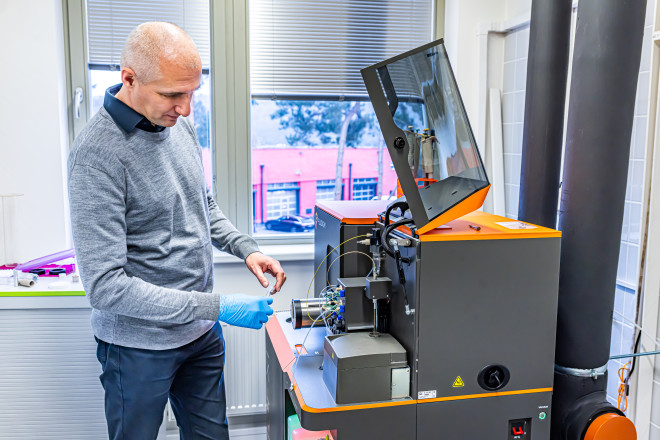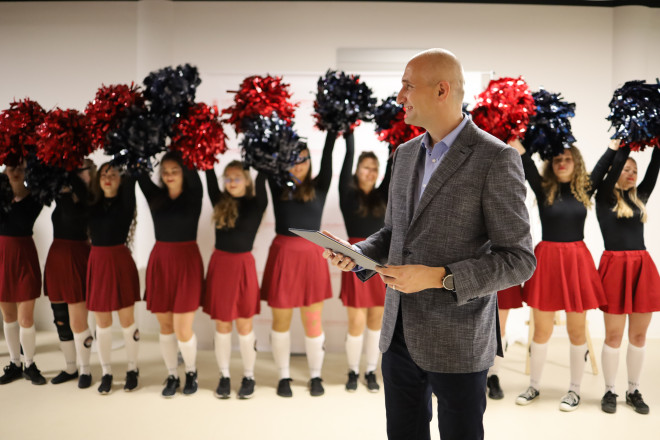You yourself were involved in science during your studies. What does undergraduate science mean to you today?
For me, it’s the starting point. Back when I was in my fourth year, I simply went and asked if I could get involved in something. Initially, it was somewhat unfulfilled expectations, but eventually, it turned into quite a success. Today, I see undergraduate science as a way to meet young colleagues who are genuinely interested in science and want to engage voluntarily. It’s an ideal way to find someone you can trust, and perhaps form relationships that could later lead to academic partnerships.
What should be the first step for a student interested in science?
The first step is curiosity. The kind that overcomes shyness or laziness, which usually prevents someone from reaching out to others. If something interests me, I should say it – after a lecture, at a scientific conference, or via email. Authenticity is the key. There is no one-size-fits-all script like "Dear Professor ...", on the contrary, it’s important to say what really grabbed your attention and why. You just need to say anything that stands out from the usual phrases, something personal, but still sincere. This way, you’ll capture their attention, and once you do, it’s up to you where things go from there.
You just need to say anything that stands out from the usual phrases, something personal, but still sincere. This way, you’ll capture their attention, and once you do, it’s up to you where things go from there.
Is it important to have prior knowledge in the field the student is interested in?
I don’t think it’s that important. If you are genuinely intrested in it, you’ll often read a few chapters of a book before the subject is officially introduced. What’s more important is the interest and the willingness to learn. That said, having a basic grasp of working with data can be very beneficial – this can be learned relatively quickly and is often more valuable than specific laboratory skills or theoretical knowledge.
How time-consuming is getting involved in science for a student?
When you're starting out, it’s hard to estimate. You don’t know what you’re doing, so everything takes time. I think a realistic amount is twice a week in the afternoon. If it’s less, you often forget what you were doing by the next week. Any more might be overwhelming for both you and your supervisor. It’s important to have time and consistency – and to plan it realistically. This also means thinking about when to take the first step so that when you approach someone, you actually have the time. It doesn’t make much sense to schedule something and then not show up for three months. It’s better to wait and schedule it for three months later.
What does scientific work bring to students?
Mainly, it makes them stop being passive recipients of information. Personally, during my studies, medicine seemed to me like a huge field, filled with so much information, and I felt so small, needing to learn it all. But science teaches us to think, to assemble, to doubt. Suddenly, we become the ones who actively create the bigger picture, piece by piece. Science also teaches us to plan and work with the fact that some things we just don’t know yet. It’s a shift in perspective – from 'I must learn this' to 'Let’s find out how it really is.

Do you think that undergraduate research can show students that science is an inseparable part of medicine, and that medicine is constantly evolving?
I would be very pleased if that impression came across. At the same time, I am aware that our entire educational system, in a way, works against this way of thinking. From kindergarten onward, we are taught that only textbooks provide the answers to how the world around us works. But in reality – and I was very surprised by this early on in my scientific life – there is actually a lot that we “do not know”. We make assumptions, we follow agreed-on protocols in clinical practice, but we would need to know more and know better. Science is a perfect example of how everything is constantly evolving. It also forces us to evolve: it teaches us to think outside of the box, and by doing so, we push things forward. I think that's one of the beautiful aspects of science in medicine: patient care constantly confronts us with the boundary between what we know and what we do not know.
And what if a student realizes that research is actually not that interesting for them?
That is absolutely fine. The key is to have trust with your mentor, to be able to say, "I tried it, but it’s not for me," whether it is about the project itself or the field of study altogether. Honesty and the ability to change direction are crucial. Riding a dead horse is not a strategy that leads to any success. (laughs)
Science is a perfect example of how everything is constantly evolving. It also forces us to evolve: it teaches us to think outside of the box, and by doing so, we push things forward.
How important is the relationship between the student and their mentor?
Extremely important. And it is not only about working with the "big names" – often, a younger researcher will have more time and energy to dedicate to teaching you the everyday basics. The relationship needs to work on a human level. If you are afraid to tell your mentor that something did not work five times in a row, the collaboration cannot succeed.
So, would you say that science is a team discipline?
One hundred percent. I know that we often imagine science as Einstein walking along the coast in New York, deep in his own thoughts. But the part of science that I see is always a team effort. Relationships need to work not only vertically (junior-to-supervisor) but also horizontally (between juniors themselves). Science can be frustrating – experiments fail, things take a long time – and that is exactly why you need a team to support you. Social dynamics are just as important as factual knowledge.
Should undergraduate research be somehow systematised?
Here, in the Czech Republic, in our circumstances, it is not easy. Medicine may be the only field where you can complete your entire degree without being required to write any thesis and that is quite unusual. Still, I believe it is best when research is pursued by those who genuinely want to engage in it. It acts as a kind of natural selection and that is actually a good thing. The ones who persist are those with a sincere interest in advancing knowledge, those willing to invest their time and effort even when it is not mandatory. Such individuals will always find their way, because for them, science is not just about ticking off requirements, but rather about the desire to discover and understand.

According to Prof. Kalina, the first step is simple — be curious, be honest, and find the time. Undergraduate research may not be for everyone, but for many, it could be the beginning of an entirely new journey.
In the upcoming months, you will get a glimpse of what such a journey might look like thanks to two enthusiastic students from the General Medicine programme, Annemarie Černohorská and Adam Sedlák, who conducted this conversation. Annemarie, now in her third year, during scientific internship realised how essential research is to medicine. Then she began to think about how to continue her involvement in science here in the Czech Republic. After joining the Academic Senate of the Faculty, she decided to seize the opportunity to explore how to make science more accessible and to ease the path for others. Adam, a second-year student passionate about research at Department of Anatomy supervised by Professor David Kachlík, frequently heard from classmates that they were interested in science but unsure where to start, whom to contact, or what a typical day as a student researcher looks like. Through a series of videos, he will take you to various research departments and give you a behind-the-scenes look at how undergraduate science works at our faculty.
